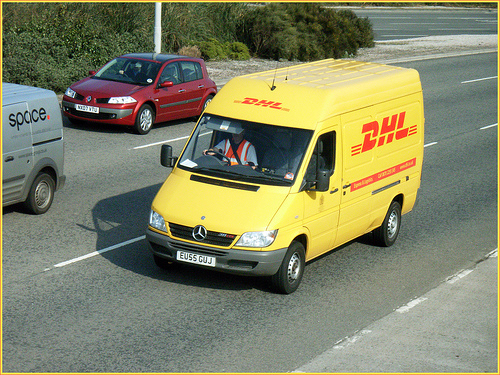DHL uses tech to stop laptops walking

Logistics company DHL has been implementing hidden security systems to stop laptops being swiped by casual staff employed at warehouses over the Christmas break.

(DHL EU55GUJ image by Graham Richardson, CC2.0)
Computers, cameras and small tech devices become easy Christmas bonuses for shifty temp staff, according to courier DHL, since logistics companies do not track the individual items. It can take months to discover the losses, if they are noticed at all.
Rather, it is up to technology companies to track and possibly disable stolen devices. But systems such as obfuscated metal detectors may stop the silly season steal, according to DHL country security manager Graeme Mayne, who spoke last week at the Security 2010 conference in Sydney.
"Technology is very high on our losses. Something may be delivered and will sit in a rack until someone pulls it down months later and finds a box missing in the centre," Mayne said. "It is sometimes very difficult to determine if a product is lost or stolen.
"We are good at having contracts with transport providers, but we are not good at locking them into liability aspect, and DHL pays a lot on loss of goods that we shouldn't."
He said metal detectors have been built into innocuous doors to catch out thieving staff.
A series of physical access controls, defence-in-depth systems (PDF) and restrictions on pallet label tampering prevents warehouse staff from stealing large amounts of equipment, but individual items are still being lifted.
Trucks are secured with an arsenal of security measures, including remote systems to starve hijacked vehicles of fuel, geofencing and CCTV.
Lifted laptops are part of a litany of stolen goods that Mayne estimates could cost the Australian logistics industry some $10 million a year.
In a bizarre move, however, logistics companies report virtually no thefts to police — less than 0.23 per cent. Mayne said problems with identifying the location of thefts, which could range over international boundaries, mean police palm-off cases, leaving companies to conduct basic internal investigations.
"Also, it is hard to determine if something is lost or stolen; I'd suggest 90 per cent of losses are [thefts]. When we lose large loads, it gets our attention."
Expensive shipments are often hidden within cheaper shipments or may be hauled in a single extra-secure truckload.
Heists involving pseudo-ephedrine are always reported to police, and are typically the work of highly-organised bikie gangs that may bribe drivers or hijack vehicles at gunpoint, Mayne said.
Staff profiling is Mayne's forte, although the former detective admits some risky staff can slip through. Broadly speaking, Mayne said a 25-year-old single male is considered a high risk profile for sensitive positions such as those dealing with pseudo-ephedrine shipments, while a 35-year-old woman with a child is regarded as the safest.
However, criminals still slip through. Last year, a former supervisor in a DHL pharmaceuticals warehouse was charged with selling thousands of dollars of ecstasy tablets to an undercover police officer after his arrest in January last year. Mayne said the man passed a profiling test and was considered for senior management positions.
"We have a great deal of trouble with bikie gangs infiltrating our business at the moment. Not as bad as others," he said.
Road transport accounts for about 80 per cent of loss for the industry globally, with air freight rated the safest.
Mayne advises security managers research criminal psychology to determine which goods are attractive and reasons why thieves expect to get away with crimes.